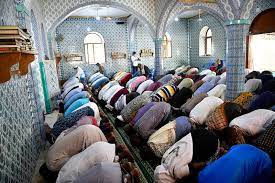Eid ul Adha 2023
It is anticipated that Eid-al Adha 2023 would start at sunset on June 28, 2023.
The Festival of Sacrifice, commonly known as Eid ul-Adha, is a significant Islamic holiday that is observed by Muslims all around the world. Since my knowledge cutoff is in September 2021, I am unable to provide information particular to the year 2023, but I can give you general information on how Eid ul-Adha is typically observed.
The holiday of Eid ul-Adha honours Prophet Ibrahim (Abraham) for his readiness to offer his son as a sacrifice to God. Just as Ibrahim was going to offer his son as a sacrifice, God sent a ram in its place. This incident represents faith, fidelity, and submission to God's will.
Muslims often engage in the following activities during the celebrations:
Muslims assemble for congregational prayers in mosques or other public spaces set aside for Eid rituals. The community joins together to worship and give thanks to Allah at the early morning prayers.
After the Eid prayer, the Imam gives a speech in which he imparts wisdom and lessons drawn from Islamic texts. The discourse frequently emphasises the value of sacrifice, faith, and the teachings learned from the life of Prophet Ibrahim.
Qurbani (Sacrifice):
In remembrance of Prophet Ibrahim's readiness to offer his son as a sacrifice, Qurbani is the ritual sacrifice of an animal, typically a sheep, goat, cow, or camel. Three portions of the sacrifice's meat are given away: one-third goes to the person making the33% of the sacrifice should go to friends and relatives, and 33% should go to the less fortunate.
After the Qurbani, Muslims feast and celebrate by giving the sacrificed meat to loved ones, friends, and those in need. Visitors frequently exchange greetings, presents, and visits during this period. Traditional cuisines are served, and celebratory banquets and feasts are made.
Eid ul-Adha encourages Muslims to practise charity and acts of goodwill, especially towards those who are in need. Muslims are expected to donate to charities and the needy in order to make sure that everyone can take part in the celebrations.
Takbeerat Eid ul Adha
The term "Takbeerat of Eid ul-Adha" refers to the recitation of particular Arabic words known as takbeerat during the Eid ul-Adha celebrations. Takbeerat, which are performed to honour the event, are declarations of Allah's (God's) magnificence and splendour.
During Eid ul-Adha, Muslims frequently recite the following takbeerat:
Allahu Akbar, Allahu Akbar, Wa lillahi al-hamd, La ilaha illallah, Allahu Akbar, Allahu Akbar.
"There is no god but Allah, Allah is the Greatest, Allah is the Greatest, and all praise is due to Allah," is the literal translation.
During the days of Eid ul-Adha, these takbeerat are said following the required prayers. They serve as a reminder of the importance of the event and the majesty of Allah. The
Muslims can express their happiness, thanks, and devotion during this particular occasion by reciting the takbeerat.
It's crucial to keep in mind that particular variants and additional takbeerat could occur based on cultural customs and regional practises. Muslims may also recite the takbeerat aloud or in groups, such as during meetings or processions of the community.
Girls on Eid
Muslims in the world celebrate Eid as a joyous holiday. The holy fasting month of Ramadan has come to a conclusion. Both boys and girls take part in the festivities on Eid, albeit the specific events may change depending on regional and cultural customs. Here are some typical Eid activities for girls:
Girls frequently participate actively in the preparations for Eid celebrations. They may assist with chores like dusting and decorating the house, hanging ornaments, arranging flowers, and cooking up a feast.
Traditional Dress: On Eid, girls typically wear new clothing. Depending on their cultural background, they might dress in colourful and elegant garments like salwar kameez, abayas, sarees, or other traditional attire. Another well-liked custom is to dye one's hands with henna.
(FAQs) related to Eid ul-Adha:
What is Eid ul Adha's significance?
A: Eid ul Adha honours the Prophet Ibrahim's (Abraham's) readiness to offer his son as a sacrifice to God. It stands for devotion, faith, and surrender to God's will. Muslims use this occasion to give thanks and reflect on the value of compassion and sacrifice.
What distinguishes Eid ul-Adha from Eid al-Fitr?
A: The Festival of Sacrifice, commonly known as Eid ul-Adha, is distinct from Eid al-Fitr. The month long fast of Ramadan comes to a close on Eid al-Fitr, while the celebration of Eid ul-Adha honours Prophet Ibrahim's willingness to offer his son as a sacrifice. While Eid ul-Adha entails the sacrifice of an animal and congregational prayers, Eid al-Fitr is distinguished by joyous dinners, gift giving, Communal prayers are held at Eid ul-Adha, but an animal is sacrificed and its meat is given to the less fortunate.
In what way is Eid ul-Adha observed?
A: Eid prayers, also known as special prayers for Eid ul-Adha, are held in mosques or public prayer areas. Muslims come for congregational prayers dressed to the nines. Giving to the needy and eating together with family and friends are additional ways to observe the day. An important part of Eid ul-Adha is the sacrifice of an animal (Qurbani), and the flesh is given to family, friends, and those in need.









0 Comments